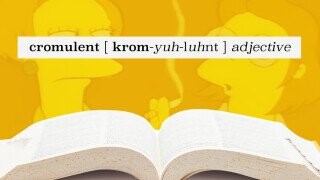‘The Simpsons’: Cromulent Is Officially A Real Word Outside of Springfield

Over 400 years ago, a silver-tongued Englishman by the name of William Shakespeare expanded the English language by adding over 1,700 original words to the unofficial lexicon. This past weekend, Matt Groening made another step toward topping that total.
The word jockeys over at Merriam-Webster are on a constant quest to embiggen the English language by adding new words coined through popular culture to the official dictionary. Periodically, the comedy world has been known to make their own contributions to the language-keepers’ quest for relevance — like when Stephen Colbert famously coined the term “truthiness” back in 2006.
Don't Miss
Despite shaping the culture of the English-speaking world in so many ways over the past 34 years, The Simpsons has only recently begun to make its impression on the linguistic community, as Merriam-Webster officially added the Simpsons-original “embiggen” to the dictionary in 2018. Then, on Friday, Merriam-Webster made their annual announcement of new words that will appear in the newest edition of the English dictionary, with 690 total terms making the cut. Among them was an entry most cromulent.
Merriam-Webster’s definition of “cromulent” reads, “acceptable, fine,” with an etymological breakdown detailing how the construction of the word was pulled directly from David X. Cohen’s ass. In the classic 1996 episode, “Lisa the Iconoclast,” Ms. Hoover uses the adjective to describe the aforementioned made-up word “embiggen” when Mrs. Krabappel notes that she’d never heard the verb before moving to Springfield.
Critically, the official coinage of “cromulent” concludes Merriam-Webster’s five-year plan to absolutely ruin the iconic Simpsons joke, as the entire point of the punchline is that neither “embiggen” nor “cromulent” were real words ever used by English-speakers outside of Springfield. Now that both are legitimized, watching “Lisa the Iconoclast” in 2023 just makes Mrs. Krabappel seem linguistically limited, which is less funny than an entire town unintentionally using made-up words.
Now if Merriam-Webster decides to add “kwyjibo” to the dictionary, they’ll be able to ruin Scrabble, too.